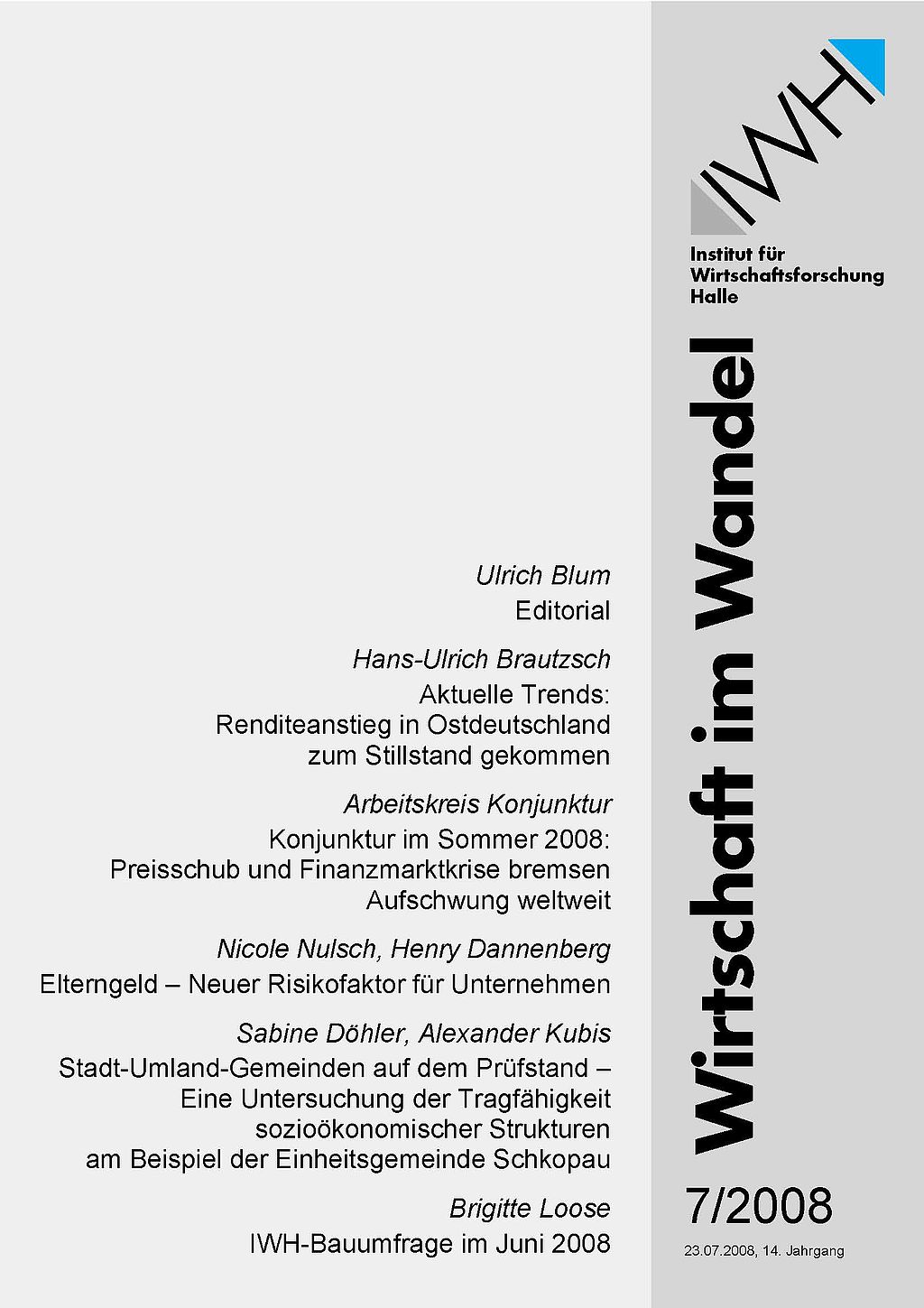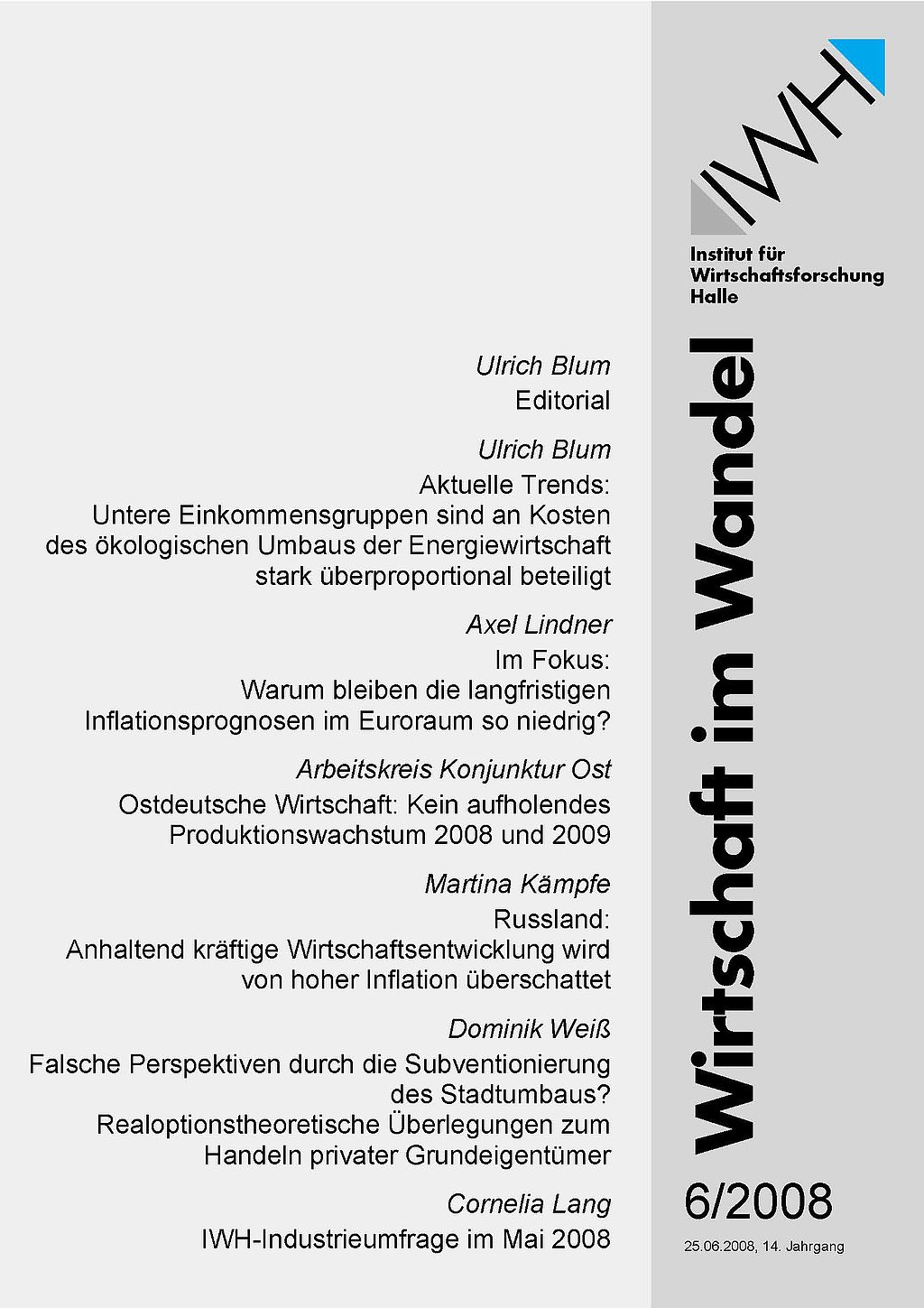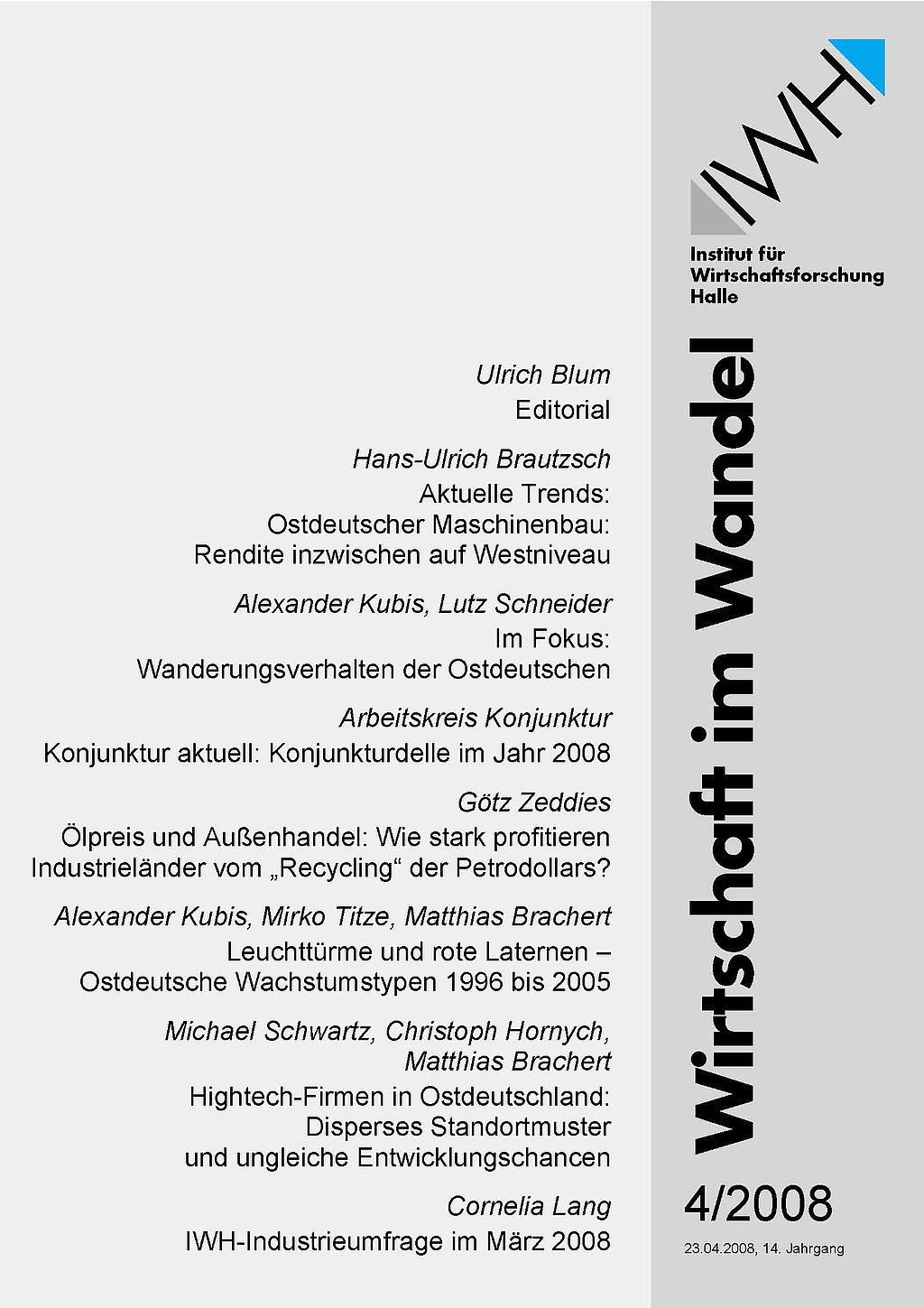Economic Forecasts
IWH regularly generates various economic forecasts for the global economy, the euro area, and the German economy for the ongoing and the following year. It also produces a separate annual forecast for the East German economy on the basis of sectoral developments in production and selected components of demand.
For this purpose it conducts regular firm surveys to collect data of economic activity.

Business Cycle Forecast 2009: World Financial Crisis Triggers Deep Recession in Germany
in: Wirtschaft im Wandel, No. 1, 2009
Abstract
At the beginning of 2009, the major industrialized economies are in recession. The financial turmoil has developed into a crisis of confidence to and solvency of the financial sector, raising financing costs and lowering the value of assets for firms and households. Monetary and fiscal policies have reacted strongly, but they will not succeed in ending the recession until the financial sectors in the US and in Western Europe have stabilized. This forecast is made under the assumption that stabilization will start in the second half of 2009 because the continued protection of important financial institutions by governments will restore confidence – albeit at a low level – and because at this time, the fall of US-house prices will start to fade off. The German economy is hit particularly hard, because the financial crisis depresses worldwide investment demand and the sectors producing investment goods are at the heart of the German economy. The recession will not end before the second half of 2009, and capacity utilization will decrease throughout the year. We expect a tentative revival to begin in a recovery of exports. While private investment will shrink markedly, consumption of private households and the government as well as public investment will dampen the downturn. GDP will shrink by 1.9% in Germany and in East Germany by 1.5% because this region is less dependent on exports. Economic policy has to help restoring confidence, and this can only be achieved if it behaves in a consistent and predictable way.

Business Cycle Forecast: On the Edge?
in: Wirtschaft im Wandel, No. 9, 2008
Abstract
During the summer of 2008, the world economy was further slowing. The financial crisis affects the real economy by tightened credit standards in the US and in the European Union, and housing markets are now in a severe crisis not only in the US, but also in some countries in Western Europe. Finally, consumption of households is affected by stagnating real disposable incomes due to the energy price hike. The slowing world economy, however, has caused the oil price to fall since July, and most emerging markets economies are, up to now, quite resilient. In Germany, sentiment has deteriorated significantly. Production appears to be about stagnating in the summer. During winter, the devaluation of the euro and a beginning pick up of demand since July will help producers of tradable goods in Germany. Domestic demand will be supported by lower energy prices and healthily growing wage incomes. All in all, gross domestic product (gdp) (adjusted for the number of working days) will increase by 1,8% this year and by 0,8% in 2009.

Business Cycle Forecast, Summer 2008: Price Hikes and Financial Crisis Cloud Growth Prospects
in: Wirtschaft im Wandel, No. 7, 2008
Abstract
In the summer of 2008 the turmoil on financial markets and that on the markets for energy dim the prospects for the world economy. The acceleration of the oil price hike during the first half of the year has led to an increase in expected inflation and to higher interest rates on capital markets, while stock prices are going down. At the same time, the financial crisis is far from over, and banks in the US and in Western Europe continue in their efforts to consolidate their balance sheets. Thus, the expansion of credit supply will be scarcer in the next quarters. All this means that demand will slow in the developed economies during the next quarters. However, the massive fiscal stimulus will help the US economy to stabilize, and the world economy still benefits from the high growth dynamics in the emerging markets economies. All in all, the developed economies will not reach their potential growth rate before the second half of 2009. In Germany, the upswing comes to a temporary halt during summer of this year. Slowing foreign demand and the oil price hike induce firms to postpone investments, and private consumption, the soft spot of the upswing in Germany, is still sluggish due to high inflation rates that impair purchasing power. For the end of 2008, chances are good that growth in Germany accelerates again, because German exporters are still penetrating emerging markets as competitiveness does not diminish. All in all, the German economy will grow by 2.3% in 2008 (mainly due to the very high dynamics at the beginning of the year) and by 1.3% in 2009. A main risk of this forecast is that monetary policy fails in easing the high inflationary pressures. As to fiscal policy, efforts to reach sustainable public finances should not weaken.

Eastern German Economy: No Catching-up in 2008 and 2009
in: Wirtschaft im Wandel, No. 6, 2008
Abstract
In the New Lander, growth of production is characterized by two diverging developments. On the one hand, the manufacturing sector has expanded strongly while the public service sector as well as the retail sectors has considerably damped economic activity. On the other hand, those firms primarily bound to local markets have gained hardly any momentum, whereas others have been stimulated by external markets in Western Germany and abroad. These differences are mainly due to weak local demand in the wake of a low purchasing power and an ongoing reduction in the population. At the same time, export-oriented firms in the manufacturing sector have benefited from strong external demand, and they will further benefit from it, although somewhat less owing to the slowing world economy. However, as East German exporting firms are less exposed to those countries where the ongoing crisis in the real estate and the financial sector has unfolded its dampening effects the most, they are also less prone to it. Accordingly, gross domestic product will increase by 1,7% this year and 0,8% in 2009. This translates into further improvements on labor markets. Registered unemployment will fall below one million. In particular, manufacturing firms and the private business service sector will increase their demand for labor.

German Economic Growth in 2008: Temporary Slow Down
in: Wirtschaft im Wandel, No. 4, 2008
Abstract
World economic growth has slowed in the first months of 2008. The main causes are the crisis in the US housing sector and the turmoil in the financial sector in general, the spreading expectation of a recession in the US, and sharply rising prices for energy and food. The German economy, though, is still expanding healthily, with strong investment and export activities. Private consumption, however, shrank at the end of 2007. In 2008, while favorable labor market conditions will improve job security and thus the propensity to consume, real incomes will not rise by much due to the risen inflation rate; consumption will again expand only modestly this year. A slower expansion of the world economy and the stronger euro will dampen exports and investment. All in all, growth will slow to (working-day adjusted) 1.2% in 2008. Chances are good that in the next year, after the negative shocks have faded out a bit, growth will be accelerating again. The East German Economy was on a lower growth path in 2006 and 2007 than the economy in the West, according to recently revised national accounts data. Industrial production, however, is more dynamic in the East. Unemployment rates will continue to decrease faster in the East: as in the rest of Germany, employment is growing, and, contrary to what happens in the West, the labor force is shrinking.



